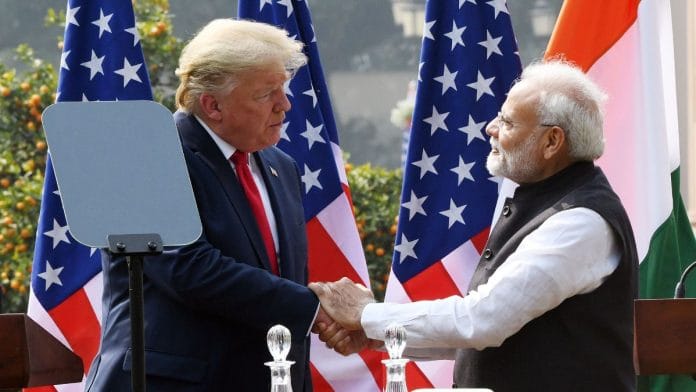As she stood in the White House one evening in July 1982 addressing the then US president Ronald Reagan, among others, Indira Gandhi described the state of India-US ties at that point thus: “No two countries can have the same angle of vision, but each country to (sic) appreciate the points of view of the others. Our effort should be to find a common area, how so ever small, on which to build and to enhance cooperation.”
The two countries have come a long way since, building on what they now refer to jointly as a “comprehensive global strategic partnership”.
With the outcome of ‘Super Tuesday’ setting the stage for a rematch between Joe Biden and Donald Trump come November, policymakers around the world are scrambling to anticipate how a second Trump presidency will bode for the US, and more importantly, its allies.
In India, the sentiment is not one of concern but rather of comfort — with the idea that irrespective of whether a Democrat or a Republican is in the White House for the next four years, the trust Washington now has in New Delhi as a reliable partner for the future is beyond doubt.
How both countries now see each other was evident in the scope of the joint statement issued during Indian Prime Minister Narendra Modi’s official state visit to the US in September last year. The 29-point joint statement covered the wide-ranging dimensions of bilateral cooperation, from security in the Indo-Pacific, reform in the UNSC, critical and emerging technologies, space cooperation and semiconductors to biotechnology.
Other key areas where the two countries have managed to maintain significant momentum are defence, cyber security, and pharmaceuticals.
Modi’s personal rapport with both Biden and Trump and the largely bipartisan endorsement of the current state of ties in both countries, coupled with historical and cultural factors like the presence of a very powerful Indian diaspora in America and a shared affinity for democracy and freedom, will further ensure the continuity of this partnership.
To add to that, an overtly assertive China will continue to influence the trajectory of India-US ties; no points for guessing in which direction. The existence of Quad (India, US, Japan and Australia) is proof enough that Beijing’s aggression in the Indo-Pacific will not go unchecked and that both the GOP and the Dems approve of the Obama-era ‘Rebalance to Asia’ pivot.
According to a paper by Frederic Grare for the Carnegie Endowment for International Peace, “In Delhi’s perception, any attempt by India to get closer to the United States must be accompanied by a parallel pursuit of further engagement with other Asian states.”
Also read: Those of Indian descent are part of the American dream. Attacks on them must be taken seriously
Possible challenges
That is not to say that there will be no challenges in India-US ties going forward.
Trump had in an interview last August said he would consider imposing a ‘reciprocal’ tax on India if voted to power in the presidential elections. He had made the remark in the context of high tax levied by India on a number of American-made products, particularly Harley-Davidson motorcycles.
“If India is charging us too, so what I want to have is a — call it retribution. You could call it whatever you want. If they are charging us, we charge them,” he had told Larry Kudlow of Fox Business News.
While Trump is not likely to follow in the footsteps of Nixon, who infamously referred to Indians as “slippery treacherous people”, his ‘America First’ policy has led to concerns among many allies.
At the same time, a Biden re-election too will pose a distinct set of challenges. One cannot ignore that the indictment in the alleged plot to assassinate Gurpatwant Singh Pannun came as a sudden jolt to bilateral ties. Pannun, a US citizen who openly espouses the idea of Khalistan — a separate nation for Sikhs — has threatened India on multiple occasions.
In a joint statement issued last December, five Indian-American legislators in the US Congress had emphasised it was “critical India fully investigate” the allegations in this regard. “The actions outlined in the indictment could, if not appropriately addressed, cause significant damage to this very consequential partnership,” they had warned.
However, despite these challenges, one can say with some certainty that the outcome of the US presidential election in November this year will in no way disrupt the current momentum in India-US ties. As a former US president famously said, “America can be India’s best partner.”
Asha Jadeja is a Silicon Valley-based entrepreneur, venture capitalist, philanthropist and a ‘change agent’. She tweets @ashajadeja325. Views are personal.
The article is sponsored by the Motwani Jadeja Foundation.






